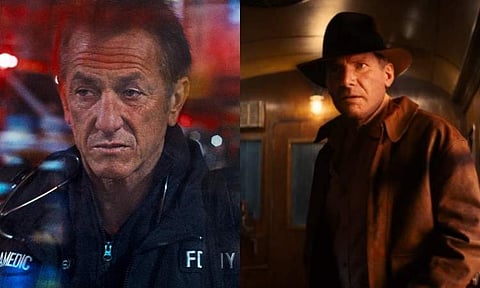

Every once in a way the red-carpet protocols and polite standing ovations at the Palais des Festivals at the Cannes Film Festival get disrupted by the sheer fever and furor of fandom. And a Grand Theatre Lumiere or Theatre Claude Debussy ends up feeling like a Gaiety-Galaxy or Chandan back in Mumbai. As it happened when loud claps and cheers greeted Harrison Ford’s “entry” in James Mangold’s Indiana Jones and the Dial of Destiny, the fifth and final installment in the film franchise.
The initial excitement, however, could not be sustained through the entire course of the film, witnessed only in fits and spurts. It's reflective of the unevenness of the film itself, swinging between highly engaging and quite dull.
The iconic archeologist and adventurer hero Indy (Ford) has a bunch of Nazis led by Jürgen Voller (Mads Mikkelsen) to contend with. We begin in 1944 with a digitally de-aged Ford helping his friend Basil Shaw obtain a timepiece called The Dial of Destiny. Then there is a move forward with Ford looking very much his age in 1969 during the Cold War. He is unhappy over the US alliance with the Nazis to get the better of the Soviet Union in the space game. Now he has Shaw’s daughter (Phoebe Waller-Bridge) accompanying him on a mission to find and seize the Dial and save the world from Voller.
With this wisp of a story, all the audience is supposed to do is totally let go of any rationality as the confusing plot gets progressively confounding. The entire experience is all about coasting along unquestioningly from one long chase sequence to another, interspersed with a few inaudible, mumbling exchanges between the characters that anyhow don’t appear to matter. Some of the chases are quite stunning and mad fun and happen not just on land but underwater and in the air as well, as the action moves from New York Apollo 11 parade to the city subway atop a horse to the alleys of Tangiers in an autorickshaw all the way to Sicily. And then hurtling towards an insane time travel of a climax back to the 214 BC, Roman War, and Archimedes. But how much chase is way too much of a chase? I wish they could have edited at least one of them out entirely to make more time for Antonio Banderas, criminally wasted in a blink-and-you-miss appearance as Indy’s friend and ally, Captain Renaldo.
A lot of money and technology have aided the recreation of the period but have not been able to make it throb with life. Even, the face-off atop the train in the opening sequence, though thrilling, looks too clunky, flat, and vanilla with all too fake, CGI figurines as the characters of the story.
Liveliness must be human after all. And Ford is reliable and charismatic as ever. But in this case, the spirit of the film truly resides in the bright spark Phoebe Waller-Bridge. Beaming, sharp, quick-witted, perceptive, and badass to boot. She is the best part about Dial and a lovely relief from the chases, even when she herself features in most of them.
----
Quite like Ford, Sean Penn is on top of his game in Jean-Stéphane Sauvaire’s maiden English language feature film Black Flies, in contention for the Palme d’Or.
As senior paramedic Gene Rutkovsky he is seemingly unruffled by the many lows of the cases he handles and the tragedies he faces daily, nor is he unduly elated by being able to save lives from the jaws of death. There is an equanimity about him as he goes about his job that masks a deep personal despair, reflected in the close-ups of the lined face, the troubled eyes, the furrowed brows, and the toothpick he continually chews on. His very presence brims over with the intensity and tension of the world he inhabits. There’s the dark Ground Zero of flashing red emergency lights and unrelenting, urgent sounds of sirens on the one hand and a broken relationship and home and loneliness away from the beloved daughter on the other.
He has a rookie Ollie Cross (Tye Sheridan) under him who has his own demons to contend with: the death of his mother in childhood. They go about the streets in an ambulance helping drug addicts, gunshot victims, and survivors of domestic abuse, in other words, violence of a myriad kind. And in the middle of it bond over noodles—spicy or bland.
Prima facie, Black Flies, based on a novel by Shannon Burke, has a lot going against it. The familiar buddy spirit trope, for instance. There is a larger lopsidedness to the screenplay as it quickly jumps from one case to another to finally land at a final bloody and horribly grim and defining one. Would it not have been better to have stayed focused on it from the very start? Or would this film have lent itself better to an episodic web series?
However, despite a predictable arc, right down to the heartbreaking climax which one can see coming, there’s an emotional tug that appeals to one’s own deepest insecurities about loss—of people, relationships, feelings, and a sense of home. It’s the solidarity in this shared inner vulnerability that still makes one care about the film and its characters.